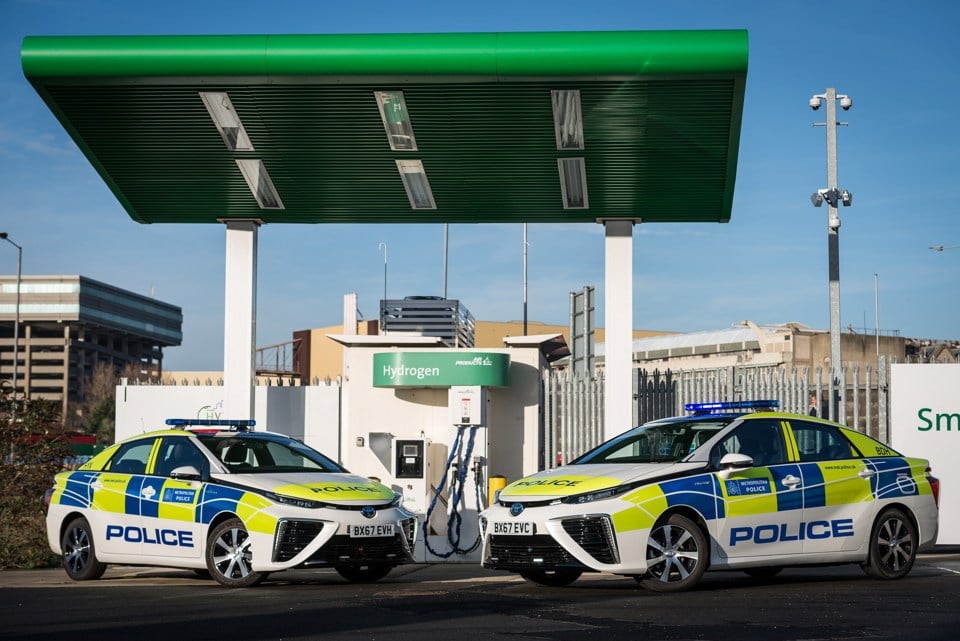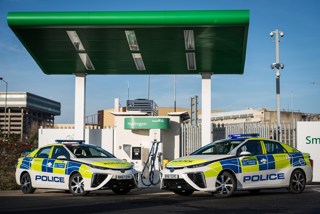Adoption of hydrogen-fuelled vehicles could be reaching a new phase with the opening of new refuelling points at conventional filling stations and new money to support the purchase of ‘greener’ vehicles for some fleets.
Shell announced it would a new hydrogen filling station at an existing site in the UK at the end of March, while the Government has injected £8.8 million into a project to help fund 200 new hydrogen police cars and taxis.
The grant will be matched by a further £13.1m investment including support from a consortium of companies and other sources. The project will involve the procurement of new vehicles, construction of new stations and upgrades to existing ones.
Shell is a member of the consortium that has won the funding, managed by Element Energy, alongside ITM Power (which specialises in installing hydrogen filling stations), Honda, Hyundai and Toyota.
Toyota also recently announced a deal to supply the Metropolitan Police with 11 Mirai hydrogen fuel cell cars, as the force commits to dramatically reduce the proportion of diesel vehicles on its fleet.
The latest hydrogen filling station is at one of the UK’s busiest service stations, Shell Beaconsfield on the M40, and will be the first site in the UK to bring hydrogen under the same canopy as petrol and diesel.
Furthermore, the hydrogen is generated on-site using an electrolyser that requires only water and electricity to generate the hydrogen gas – which is more environmentally friendly than creating the hydrogen from methane gas and transporting it to sites around the country.
The water used at the site to create the hydrogen gas is put back into the atmosphere from the exhaust of the hydrogen vehicles, which emit only heat and water.
Hydrogen cars are driven by an electric motor, with energy produced within the fuel cell stored in a battery, and have a typical range of more than 300 miles. They take a similar time to refuel as a petrol or diesel car.
The hydrogen station at Beaconsfield is the fifth hydrogen refuelling site in the UK to be supplied by ITM Power and will be the first to be opened as part of the Hydrogen Mobility Europe (H2ME) project.
The initiative has been partially funded by the European Fuel Cells and Hydrogen Joint Undertaking (FCHJU), and the UK’s Office of Low Emission Vehicles (OLEV).
Mike Copson, hydrogen business development manager at Shell, said: “We’re delighted to be opening a new refuelling site at Shell Beaconsfield, demonstrating our commitment to hydrogen as a vital part of the UK’s future transport system.
“Bringing hydrogen under the canopy for the first time is a fantastic step towards making it a convenient and viable fuel choice for UK drivers.”
Copson told Fleet News the roll-out of new hydrogen filling stations can only take place with fuel providers, Government and vehicle manufacturers working together.
He said planning as part of a consortium will lead to fuelling points in key areas and clusters vehicles that use them. The longer range of a fuel-cell vehicle compared with battery electric cars would also help create a network that connects major cities.
However, he said he didn’t want to estimate the rate of growth of hydrogen refuelling points in the future.
Police cars and taxis will be among nearly 200 new hydrogen-powered vehicles switching to zero emission miles, thanks to the multi-million pound Government boost.
The Metropolitan Police expects to see a 60% reduction in the number of diesel vehicles on its fleet by 2020. A spokeswoman for the Met said: “The hydrogen Mirais will be used as emergency frontline response vehicles in both a marked and unmarked capacity. We expect these to travel approximately 50 miles per day.”
As well as the Mirais, the force also has in service 11 BMW C Evolution scooters, 30 Nissan Leafs and seven Suzuki Bergman hydrogen scooters on trial. It has also recently begun taking delivery of 50 Nissan e-NV200 vans.
Roads Minister Jesse Norman said: “Hydrogen has huge potential, especially for those making longer journeys and clocking up high mileage.”



















Login to comment
Comments
No comments have been made yet.